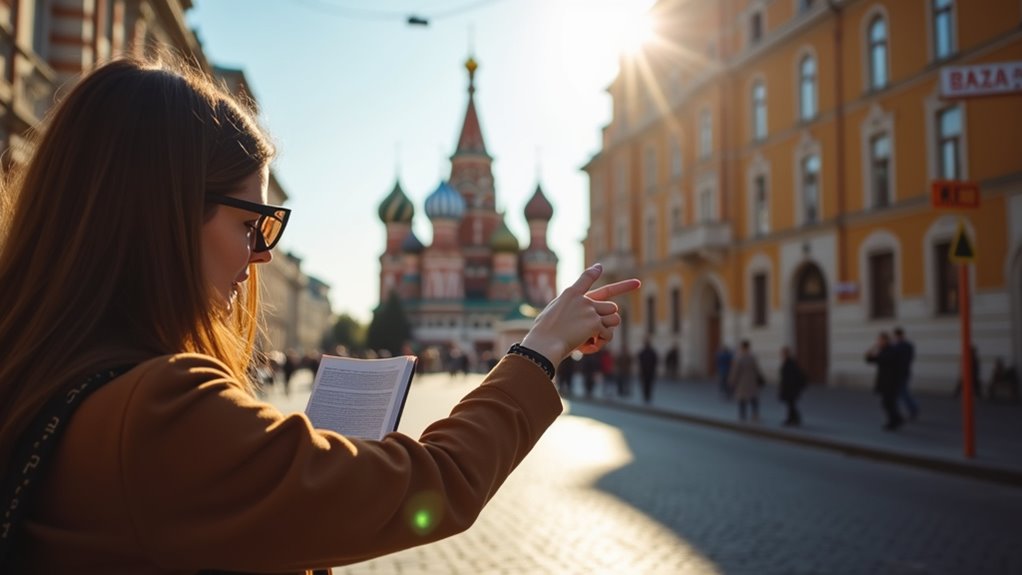Physical Address
304 North Cardinal St.
Dorchester Center, MA 02124
Physical Address
304 North Cardinal St.
Dorchester Center, MA 02124

Only these 11 key Russian phrases can transform you from confused tourist to confident communicator, but mastering them requires knowing one secret.
Russian beginners should start with these essential phrases: “Здравствуйте” (formal hello), “Привет” (casual hello), “Спасибо” (thank you), “Пожалуйста” (please/you’re welcome), “Меня зовут…” (My name is…), “Где” (where), “Что” (what), “Как” (how), “Помогите!” (help!), “Извините” (excuse me/sorry), and “До свидания” (goodbye). With these basics, you’ll navigate simple conversations and show respect for Russian culture. The rest of this guide expands your Russian toolkit.

Why does Russian have so many different ways to say hello? It’s all about social context and showing appropriate respect.
For formal situations, you’ll want to use “Здравствуйте” (Zdravstvuyte) when meeting strangers, elders, or in professional settings.
If you’re answering a formal phone call, “Алло” or “Да, здравствуйте” works perfectly.
With friends and family, switch to the casual “Привет” (Privyet).
For a playful tone, try “Приветик” (Privetik) or the teenager-friendly “Хай” (Khaj).
Time-specific greetings like “Доброе утро” (good morning) or “Добрый вечер” (good evening) work in both formal and informal contexts.
When meeting someone after a long absence, Russians often say “Сколько лет, сколько зим!” which literally means long time, no see.
Just like you’d greet locals when snorkeling in Dubrovnik, learning Russian greetings shows respect for the culture.
How can you navigate social interactions in Russian without knowing how to be polite? Learning basic courtesy phrases is essential for making a good impression.
Start with “спасибо” (spasiba) for a simple “thank you” or add “большое” before it for extra gratitude. When someone thanks you, respond with “пожалуйста” (pozhALUysta) or the casual “не за что” (ne za chto).
Need to apologize? Use “извините” (izvinite) in formal situations or “прости” (prosti) with friends. When meeting someone for the first time, you can say Приятно познакомиться! to express that you’re pleased to meet them.
For polite requests, try “можно ли” (mozno li) or the formal “не могли бы вы” (ne mogli by vy).
Other useful expressions include “благодарю” (blagodaryu) as another way to express thanks and “будьте добры” (bud’te dobery) when asking for something politely. While exploring Poland with your new Russian language skills, be aware that the country is home to several dangerous animals that require caution when venturing into rural areas.

Now that you’ve mastered polite expressions, let’s move to proper introductions in Russian.
The standard formal greeting is “Здравствуйте” (Zdravstvuyte), while “Привет” (Privet) works for casual situations.
To introduce yourself formally, say “Меня зовут…” (Menya zovut…) meaning “My name is…”
When meeting someone, you’ll want to ask “Как вас зовут?” (Kak vas zovut?) in formal settings or “Как тебя зовут?” (Kak tebya zovut?) informally.
After introductions, it’s customary to say “Очень приятно” (Ochen’ priyatno) – “Pleased to meet you.”
You can then mention your age with “Мне … лет” (Mne … let) and occupation using “Я…” (Ya…).
For sharing hobbies, start with “Одно из моих хобби…” (Odno iz moikh hobbie…).
If you’d like to mention where you’re from, simply say “Я из России” (Ya iz Rossii) or substitute with your own country.
Unlike in Switzerland where language barriers might present challenges, most Russians appreciate when travelers make an effort to speak their language, even just basic phrases.
When traveling in Russia, question words become your most valuable linguistic tools. Master these five essentials: Кто (who), Что (what), Где (where), Когда (when), and Как (how).
You’ll frequently use phrases like “Где ближайший ресторан?” (Where’s the nearest restaurant?) or “Как добраться до центра?” (How do I get to the center?).
For transportation, try “Как мне доехать до аэропорта?” (How do I get to the airport?).
Combine question words for more complex inquiries: “Кто может сказать, когда открывается музей?” (Who can tell me when the museum opens?).
When seeking information about attractions, use “Что посмотреть здесь?” (What should I see here?).”
With these fundamental question words, you’ll navigate Russian-speaking environments with greater confidence and effectiveness.
If you need to question someone’s purpose or intention, use “Зачем ты это делаешь?” (Why are you doing this?/What are you doing this for?).
Unlike in Scandinavian countries, where English is widely spoken, knowing these Russian phrases is essential for effective communication in Russia.

Traveling through Russian cities becomes much easier once you’ve mastered basic directional phrases. When asking for help, simple questions like “Куда́ нам идти́?” (Where should we go?) and “Где́…?” (Where is…?) will quickly become your best friends.
To navigate confidently around Russian-speaking areas, remember these essential directional terms:
Knowing these key Russian directional phrases will help you explore with confidence and connect with locals.
For more complex navigation, you can use compound directions like юго-запад (southwest) and северо-восток (northeast), which are formed by combining cardinal directions with the prefix о- and a hyphen.
Whether you’re exploring Russia or visiting the Mediterranean islands of Greece or Malta, having basic directional vocabulary will significantly enhance your travel experience.
Don’t worry about perfect grammar – Russians will appreciate your effort and usually understand what you’re trying to ask.
Once you’ve found your way around Russian cities, you’ll naturally want to enjoy the local cuisine. Learning a few key phrases will make ordering much easier.
Start with “Я хочу…” (I want) or “Я буду…” (I’ll have) when placing your order. If you’re unsure what to get, ask “Что вы рекомендуете?” (What do you recommend?). To check if a dish is available, say “У вас есть…?” (Do you have…?).
When you’re ready for the bill, simply say “Счет, пожалуйста” (Check, please). Remember to address waiters as “Официант” and don’t forget your “спасибо” (thank you) when they bring your food.
For a proper Russian dining experience, toast with “За ваше здоровье!” (To your health!). Many travelers find Russian cuisine quite different from Scandinavian food options they might be familiar with in countries like Denmark or Sweden. If you encounter any issues with your meal, you can politely mention that “The dish is too salty” or request additional items as needed.

Shopping in Russia becomes much easier when you know how to ask about prices and negotiate. When browsing markets or stores, you’ll want to confidently inquire about costs and potentially haggle for better deals.
Shopping in Russian markets requires confident price inquiry and skilled negotiation to secure the best possible deals.
Here are essential Russian shopping phrases:
Don’t forget that haggling is common in markets but not in department stores or supermarkets. Unlike countries with dangerous animals to worry about, shopping in Russia is generally a safe experience for travelers. After deciding on a purchase, you can confirm your intention by saying “Я беру это” which means “I’ll take this” in Russian.
When visiting a foreign country, knowing emergency phrases can literally save your life. In Russia, memorize these critical expressions:
For immediate help, use “Помогите!” (Pomogite!) meaning “Help!” or “Скорая помощь!” (Skoraya pomosch!) for “Ambulance!”
If you’re unwell, say “Мне плохо” (Mne plokho) or ask “Есть ли тут врач?” (Yest’ li tut vrach?) to find a doctor.
If you’ve been robbed, say “Меня обокрали” (Menya obokrali).
During emergencies, “Где выход?” (Gde vykhod?) helps locate exits.
In case of fire, shout “Пожар!” which is the Russian emergency alert for fire situations.
Learning basic greetings first will make it easier to approach locals for help during emergencies.
Can’t understand responses? Say “Я не говорю по-русски” (Ya ne govoryu po-russki) and ask “Говорите по-английски?” (Govorite po-angliyski?) to find English speakers who can assist you.

The first five numbers in Russian are essential building blocks for everything from shopping to telling time.
You’ll need to remember that Russian numbers have gender variations for 1 and 2.
<
ul>
Remember that proper pronunciation is key—stress falls on the first syllable of один, while пять has just one stressed syllable.
These first five numbers form the foundation for counting in Russian and will help you understand larger numbers as you progress in your learning journey.
Learning these basic Russian numbers will give you confidence when exploring island destinations like Cyprus or Tenerife, where Russian travelers are common.
Now that you can count in Russian, let’s move on to phrases that’ll help you make friends with native speakers.
Start with “Привет!” (Privet) for a casual hello, followed by “Как тебя зовут?” (Kak tebya zovut) to ask someone’s name. When meeting up, suggest “Пропустим стаканчик?” (Propustim stakanchik) to invite them for a drink or “Повеселимся” (Poveselimsya) to propose having fun together.
Show enthusiasm with “Класс!” (Klass) or “Крутой!” (Krutoy) when you like something. For casual check-ins, ask “Как сам?” (Kak sam). If you’re not interested in something, a relaxed “Мне до лампочки” (Mne do lampochki) works perfectly. When someone asks how you’re doing, respond with “Хорошо, спасибо” (Khorosho, spasibo) which means “fine, thanks” in Russian.
While learning these phrases, consider that Russian culture, like Austrian traditions, offers a rich experience distinct from Scandinavian countries.
End conversations with a friendly “Пока!” (Poka) or “До скорого!” (Do skorogo) to say goodbye.

How do you respond appropriately in Russian conversations? Mastering basic responses will help you navigate simple interactions with confidence. When someone thanks you, respond with “Пожалуйста” (Pozhalujsta) or the casual “Не за что” (Ne za chto).
Here are essential Russian responses you’ll need:
When speaking with someone formally, always use the Вы form instead of the informal “ты” to show proper respect.
Remember that “Да” and “Нет” will get you through many situations, but adding these phrases shows you’ve gone beyond the basics.
You’ve now got 11 Russian phrases that’ll make your travels smoother and more authentic. Have you noticed how locals respond when you speak even a little of their language? They’re instantly more welcoming. Keep practicing these basics and you’ll discover they open doors that remain closed to travelers who don’t make the effort. Next time you’re in Russia, test this theory yourself!